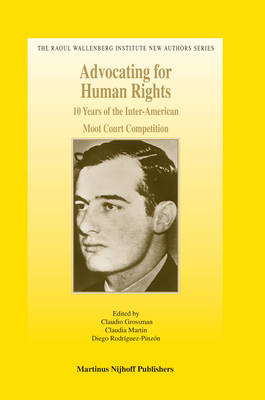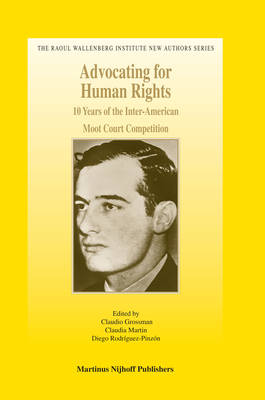
Je cadeautjes zeker op tijd in huis hebben voor de feestdagen? Kom langs in onze winkels en vind het perfecte geschenk!
- Afhalen na 1 uur in een winkel met voorraad
- Gratis thuislevering in België vanaf € 30
- Ruim aanbod met 7 miljoen producten
Je cadeautjes zeker op tijd in huis hebben voor de feestdagen? Kom langs in onze winkels en vind het perfecte geschenk!
- Afhalen na 1 uur in een winkel met voorraad
- Gratis thuislevering in België vanaf € 30
- Ruim aanbod met 7 miljoen producten
Zoeken
Advocating for Human Rights
10 Years of the Inter-American Moot Court Competition
Claudia Martin, Diego Rodríguez-Pinzón
€ 642,95
+ 1285 punten
Omschrijving
Moot Court competitions constitute an alternative model of human rights training, giving students the skills to contribute to the development of international human rights law and thus make them qualified advocates for human rights change in their home countries and abroad. By focusing on the perfection of oral as well as written skills, participants are more likely to be successful not only in cases brought before their home courts, but in front of international tribunals and other organs. Such competitions have opened the doorway for more human rights classes in law schools, more clinical training programs, more NGOs dedicated to human rights law, and overall more lawyers dedicated to participating in an expanded notion of a human rights community. As demonstrated in this volume, moot court competitions have revolutionized human rights legal education in Africa, Europe and the Americas.
The yearly Inter-American Human Rights Moot Court Competition was established in 1995. The full text of the hypothetical cases, bench memoranda, and winning memorials from the first ten years of this Competition are included as a resource to be used creatively by scholars, NGOs, international organizations, governments, practitioners, students, etc., to further promote human rights legal obligations.
The yearly Inter-American Human Rights Moot Court Competition was established in 1995. The full text of the hypothetical cases, bench memoranda, and winning memorials from the first ten years of this Competition are included as a resource to be used creatively by scholars, NGOs, international organizations, governments, practitioners, students, etc., to further promote human rights legal obligations.
Specificaties
Betrokkenen
- Auteur(s):
- Uitgeverij:
Inhoud
- Aantal bladzijden:
- 976
- Taal:
- Engels
- Reeks:
- Reeksnummer:
- nr. 3
Eigenschappen
- Productcode (EAN):
- 9789004162594
- Verschijningsdatum:
- 25/07/2008
- Uitvoering:
- Hardcover
- Formaat:
- Genaaid
- Afmetingen:
- 165 mm x 244 mm
- Gewicht:
- 1678 g

Alleen bij Standaard Boekhandel
+ 1285 punten op je klantenkaart van Standaard Boekhandel
Beoordelingen
We publiceren alleen reviews die voldoen aan de voorwaarden voor reviews. Bekijk onze voorwaarden voor reviews.









